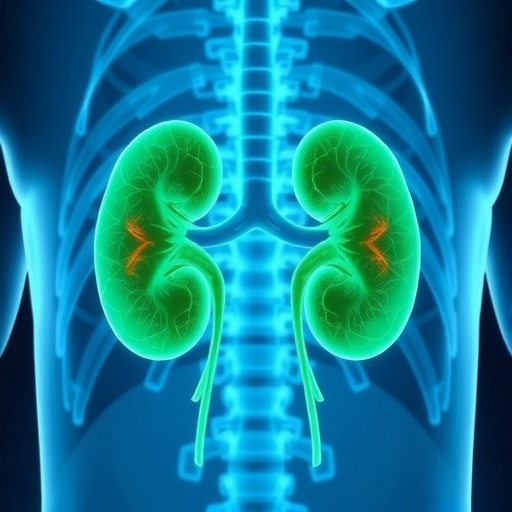Kidney cancer is poised to become an escalating global health crisis over the next quarter-century, driven predominantly by modifiable risk factors that are becoming increasingly prevalent worldwide. Recent research published in the esteemed journal European Urology delineates a stark forecast: the incidence of kidney cancer cases is projected to double by 2050 if current trends persist. This projection underscores the critical need for widespread public health initiatives targeting preventable causes alongside advancements in detection and treatment methodologies.
The foundation of this study is a comprehensive systematic review conducted by an international consortium of researchers, including experts from the Fox Chase Cancer Center. Their analysis incorporates epidemiological data from diverse geographic regions, revealing not only the rising incidence of kidney cancer but also the complex interplay of genetic predisposition, environmental influences, and lifestyle factors contributing to this trend. In 2022 alone, nearly 435,000 new cases were identified globally, culminating in around 156,000 deaths, a figure that could surge dramatically without intervention.
One of the pivotal insights of the study is the identification of modifiable risk factors as the primary drivers behind the anticipated surge in kidney cancer incidence. Obesity, smoking, sedentary lifestyles, diabetes mellitus, and hypertension constitute a constellation of conditions that collectively elevate renal carcinoma risk. The mechanistic pathways through which these factors influence carcinogenesis involve chronic inflammation, hormonal imbalances, metabolic dysregulation, and vascular injury within renal tissue, creating an environment conducive to malignant transformation.
The review emphasizes that more than half of all kidney cancer cases worldwide are attributable to these preventable risk factors, painting a picture of a largely avoidable epidemic if robust preventive measures are enacted. Weight management, rigorous control of blood pressure and blood glucose levels, and comprehensive smoking cessation programs emerge as pillars of primary prevention. From a molecular standpoint, these lifestyle modifications mitigate the cellular stress and DNA damage that otherwise facilitate oncogenesis in renal epithelial cells.
Geographical disparities in kidney cancer outcomes further complicate the global scenario. Five-year survival rates exhibit marked variation, ranging between 40% and 75%, heavily influenced by socioeconomic status and accessibility to healthcare services. Wealthier regions benefit from routine imaging technologies such as ultrasound and CT scans, enabling earlier detection when tumors are more amenable to curative interventions. Additionally, advances in minimally invasive surgical techniques, targeted systemic therapies, and precision radiation modalities have collectively enhanced patient prognosis in these areas.
Conversely, in resource-limited settings, late-stage diagnoses predominate, contributing to poorer survival statistics. The review calls attention to the necessity for equitable healthcare infrastructure development to bridge this gap. Investments in screening programs, public education campaigns, and training of oncology specialists are critical to enhancing early detection and delivering state-of-the-art treatments in underserved regions.
Genetic predisposition accounts for an estimated 5% to 8% of kidney cancer cases, implicating a subset of hereditary syndromes. Mutations in specific oncogenes and tumor suppressor genes, such as VHL (Von Hippel-Lindau), MET, and fumarate hydratase, confer increased susceptibility. Genetic testing is strongly recommended for individuals diagnosed at a young age, those presenting with bilateral renal tumors, or patients with a strong family history of renal cancer. This stratification enables personalized surveillance protocols and informs therapeutic decision-making.
Emerging genomic technologies are expanding our understanding of the molecular landscape underpinning renal carcinogenesis. Whole-exome sequencing and transcriptomic profiling have unveiled novel mutations and signaling pathways that drive tumorigenesis. Such discoveries are fostering the development of next-generation targeted therapies that tailor treatment to the unique genetic profiles of individual tumors, aligning with the broader precision medicine movement in oncology.
Lifestyle interventions remain the cornerstone of kidney cancer prevention. The cumulative evidence supports the implementation of public health strategies centered on obesity reduction through dietary modifications and increased physical activity. Control of metabolic comorbidities, including optimal management of hypertension and diabetes, further reduces oncogenic risk factors. Smoking cessation programs not only diminish kidney cancer risk but concurrently lower the incidence of a myriad of other malignancies and cardiovascular diseases.
Beyond individual behavior change, environmental and occupational exposures also warrant scrutiny as contributory elements in renal cancer etiology. Exposure to carcinogenic agents such as certain heavy metals, industrial chemicals, and prolonged contact with pesticides has been epidemiologically linked to increased risk. Regulatory policies aimed at minimizing these exposures are indispensable components of comprehensive cancer prevention frameworks.
As the global health community prepares for the anticipated escalation in kidney cancer burden, interdisciplinary collaboration among policymakers, clinicians, researchers, and public health experts is imperative. This collective effort must prioritize early detection through improved screening technologies, equitable access to care, and intensive research into novel therapeutic avenues. Moreover, raising public awareness about modifiable risk factors can empower individuals to adopt healthier lifestyles, ultimately attenuating the trajectory of this growing epidemic.
In summary, kidney cancer exemplifies the complex interrelation of genetic, environmental, and lifestyle factors that converge to drive an alarming rise in disease incidence. The evidence presented reinforces the urgency of synergistic approaches combining prevention, early diagnosis, and personalized treatment to curb this trend. The insights provided by this systematic review chart a vital course for future research, clinical practice, and health policy aimed at mitigating kidney cancer’s expanding global impact.
Subject of Research: People
Article Title: Epidemiology of Renal Cancer: Incidence, Mortality, Survival, Genetic Predisposition, and Risk Factors
News Publication Date: October 1, 2025
Web References: https://www.sciencedirect.com/science/article/abs/pii/S0302283825003458
References: DOI 10.1016/j.eururo.2025.06.005
Keywords: Kidney cancer, Disease susceptibility, Risk factors




